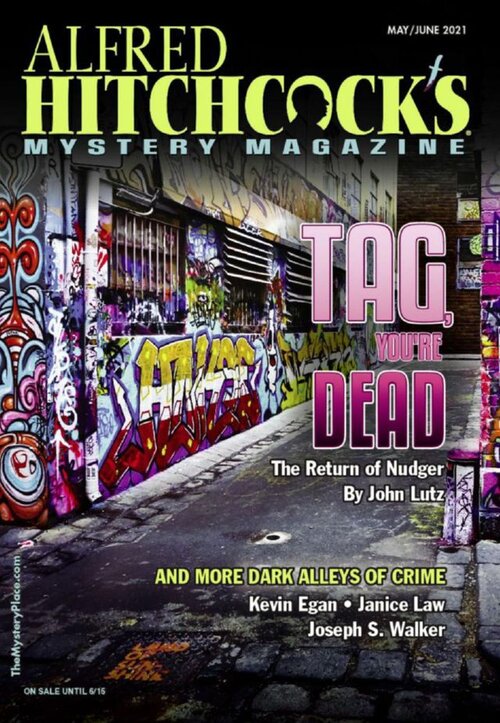Magazine Review: Alfred Hitchcock’s Mystery Magazine May/June 2021 edited by Linda Landrigan
In 1956, HSD Publications wanted to create a new mystery story magazine. To boost sales, they licensed the name of Alfred Hitchcock, a famous director who was then the host of a popular television show. While Mr. Hitchcock otherwise had nothing to do with the magazine, it has continued since to offer up tales of suspense and twisted crime that have at least some of the feel of his work.

“The Witches of Endor” by Janice Law starts this issue with sisters making a diorama. They make a living creating miniature recreations of crime scenes to teach forensics. This one’s a bit different as it’s an unsolved crime. But as the women finish the project, they realize they might have called up a ghost that points to a solution.
“Lydia’s Law” by Kevin Eagan has a court officer sent to check up on a retired judge who hasn’t responded to some paperwork he was sent. The local hardware store clerk, Lydia, is also concerned about the judge. Content note: elder abuse.
“The Road to Hana” by R.T. Lawton is set in Hawaii. A vacationing police detective gets a new favorite restaurant. But a bad review by a food critic is hurting business.
“Tag, You’re Dead” by John Lutz is the final “Nudger” story as the author has passed away. The private eye has lost his office due to the new landlord wanting to fit in with he gentrification of the neighborhood. But Nudger isn’t going to let this stop him from solving the murder of a graffiti artist. It works pretty well as a last story.
“Wednesdays at Ten” by Joseph S. Walker features a therapist with a client who has zero interest in healing or dealing with his issues. He just wants to rant about his stepmother. But he controls the therapist’s rent so she can’t cut him loose. Then she figures out another way to resolve the issue. But is murder really the best solution?
“The Fourth Circle” by Robert Lopresti features Nick, an agent who overhears an actor saying he’d sell his soul for a particular audition. There’s a double twist to this one.
“Minerva James and the Judgement of the Furies” by Mark Bruce is set in the 1960s. The title defense attorney has an obnoxious client charged with murdering his girlfriend. There’s some room for doubt, but his sexism and privileged behavior aren’t helping the case. There’s an Agatha Christie reference.
“The Devil in Preemption” by Max Gersh is a short shocker about a traveling revival show. Bob Trask has an act where he reads the scripture with a glass eye. But not everyone is a believer.
“The Case of the Brain Tuber” by Mark Thielman is set in Idaho. A down on his luck private eye has been forced to take a job as a potato mascot at the Idaho Potato Museum. Tonight’s a big night as a new member is being added to the Potato Hall of Fame. Which is all fine and dandy until the murder happens. This one is fairly humorous.
“Booked & Printed” by Laurel Flores Fantauzzo is the book review column, which looks at three novels in which fathers figure.
“A Death in the Parish” by Nick Spencer takes us to Africa, where an Anglican priest has been strangled to death with barbed wire. It’s looking bad for the curate, but there are others who have a motive.
“School Spirits” by James Lincoln Warren is set in a magic school, where feuding stepsisters find themselves suspected when a teacher is cursed. This is one of those stories where the main character hears something that doesn’t make sense, which allows her to figure out what’s really going on.
“Last Waltz Across Texas” by Michael Bracken has a country western singer checking in to the same hotel room his father had on his big tour of Texas the year the singer was born. What he doesn’t know is that there was someone else in that room when his father got the message.
“Scratch” by Robert Mangeot is about a small town police chief investigating the theft of a cash register from the local convenience store. This is one of the weaker stories in the issue, going on too long for the content.
“Mr. Tesla Likes to Watch” by Joseph D’Agnese is set in the 1890s, and has Nikola Tesla and Samuel Clemens (friends in real life!) compete to solve the question of who’s sabotaging a local florist’s deliveries. The language of flowers takes an important part.
“Gatorpalooza” by Alan Orloff takes us to Florida, and one of the two great alligator exhibits in the area. Except that now Casper, the giant albino alligator, has been accused of eating the owner of Gatorpalooza. Can ex-con Brandon Harris clear Casper’s name?
“Brothers Out of Time” by David Bart has a boy bonding with an old man who’s returned to the abandoned summer camp the boy’s family now owns to finally solve the disappearance of a young man a century before. This story moved me more than any other in the issue. Content note: rape and racism in the backstory.
“Case Files: First Responders and the COVID-19 Pandemic” by Lee Lofland and Denene Lofland, PhD is what it sounds like. Mostly sound information on how cops had to change procedures to lessen risk of infection, but a little tone-deafness to current issues regarding excessive force.
There’s also a couple of puzzles, and the results of a picture caption contest.
A good lineup of short stories; I think Mr. Hitchcock would be pleased.

